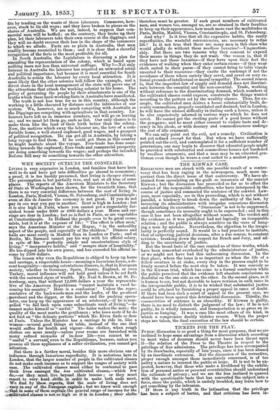THE KIRWAN CASE.
REFLECTING men are struck with one possible result of a contro- versy that has been raging in the newspapers, much more im- portant than the direct issue of that controversy. We have ab- stained from speculating on the guilt or innocence of the convict Kirwan ; but the discussion has proceeded so far as to affect the conduct of the responsible authorities, who have interposed in the course of justice and commuted the sentence of the convict. Law- yers, more especially, see in this proceeding, which is not without parallel, a tendency to break down the authority of the law, by menacing its administrators with irregular censorious discussion and disturbing its execution. "Discussion" is not to be suppressed, , though sometimes its necessity ought to be superseded ; and in this, - case it has not been altogether without reason. The verdict,efid the evidence as it was published had not logically an inseparable relation ; and the public is always sensitive on the score of hang- ing a man by mistake. Nevertheless, the objection to the irregu- larity is perfectly sound. It would be a bad practice to institute, that of subjecting judicial decisions, after a due course, to constant revision ; breaking down the respect for Bench and Jury, and ad- ding to the uncertainty of justice. But the broad facts of the case remind us of three truths, which have been Somewhat overlooked by the administrators of justice, or we might not have had this unbecoming discussion. In the first place, where the issue is so important as when the life of a fellow creature is at stake, every step in the process ought to be firmly secured before the next step be taken. It was scarcely so in the Kirwan trial, which has come to a formal conclusion while the public perceived that the evidence left absolute conclusions as doubtful on the one side as on the other. In the second place, as it is human to err, but not desirable to leave revision in such eases to the irresponsible public, it is to be wished that substantial justice could be attained by furnishing a proper appeal in cases of doubt. If there had been such a court of appeal in the present case, we should have been spared this detrimental discussion. Thirdly, the commutation of sentence is an absurdity. If Kirwan is guilty, there is no need to disturb the judgment of the law; if, he is not guilty, he is wholly innocent, and transportation is as gross an in- justice as hanging. It was a case like most others of its kind, in which a compromise doubly violates reason. When the proper steps are taken, the final execution of the law should be certain.
























 Previous page
Previous page